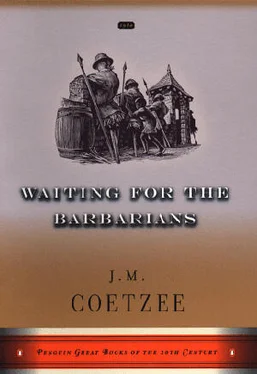He ignores me. A comrade helps him to clamber on to the roof. Balancing on two struts, he begins to stamp holes in the roof with the heel of his boot. I hear the thuds inside as the grass and clay plastering falls.
"Stop it!" I shout. The blood pounds in my temples. "What have they done to harm you?" I grab at his ankle but he is too far away. I could tear out his throat in this mood.
Someone thrusts himself before me: the friend who helped him up. "Why don't you fuck off," he murmurs. "Why don't you just fuck off. Why don't you go and die somewhere."
Under the thatch and clay I hear the roof-strut snap cleanly. The man on the roof throws out his hands and plunges through. One moment he is there, his eyes wide with surprise, the next moment there is only a puff of dust hanging in the air.
The mat over the doorway is pushed aside and he staggers out clutching his hands together, covered from head to toe in ochre dust. "Shit!" he says. "Shit, shit, shit, shit, shit!" His friends howl with laughter. "It's not funny!" he shouts. "I've hurt my fucking thumb!" He squeezes his hand between his knees. "It's fucking sore!" He swings a kick at the wall of the hut and again I hear plaster fall inside. "Fucking savages!" he says. "We should have lined them up against a wall and shot them long ago-with their friends!"
Looking past me, looking through me, declining in every way to see me, he swaggers off. As he passes the last hut he rips off the mat over the doorway. The strings of beads with which it is decorated, red and black berries, dried melon-seeds, break and cascade everywhere. I stand in the road waiting for the quivering of rage in me to subside. I think of a young peasant who was once brought before me in the days when I had jurisdiction over the garrison. He had been committed to the army for three years by a magistrate in a far-off town for stealing chickens. After a month here he tried to desert. He was caught and brought before me. He wanted to see his mother and his sisters again, he said. "We cannot just do as we wish," I lectured him. "We are all subject to the law, which is greater than any of us. The magistrate who sent you here, I myself, you-we are all subject to the law." He looked at me with dull eyes, waiting to hear the punishment, his two stolid escorts behind him, his hands manacled behind his back. "You feel that it is unjust, I know, that you should be punished for having the feelings of a good son. You think you know what is just and what is not. I understand. We all think we know." I had no doubt, myself, then, that at each moment each one of us, man, woman, child, perhaps even the poor old horse turning the mill-wheel, knew what was just: all creatures come into the world bringing with them the memory of justice. "But we live in a world of laws," I said to my poor prisoner, "a world of the second-best. There is nothing we can do about that. We are fallen creatures. All we can do is to uphold the laws, all of us, without allowing the memory of justice to fade." After lecturing him I sentenced him. He accepted the sentence without murmur and his escort marched him away. I remember the uneasy shame I felt on days like that. I would leave the courtroom and return to my apartment and sit in the rocking-chair in the dark all evening, without appetite, until it was time to go to bed. "When some men suffer unjustly," I said to myself, "it is the fate of those who witness their suffering to suffer the shame of it." But the specious consolation of this thought could not comfort me. I toyed more than once with the idea of resigning my post, retiring from public life, buying a small market garden. But then, I thought, someone else will be appointed to bear the shame of office, and nothing will have changed. So I continued in my duties until one day events overtook me.
* *
The two horsemen are less than a mile away and already beginning to cross the bare fields by the time they are spied. I am one of the crowd that, hearing shouts from the walls, pours out in welcome; for we all recognize the green and gold battalion standard they bear. Among scampering excited children I stride across the freshly turned clods.
The horseman on the left, who has been riding shoulder to shoulder with his companion, turns away and trots off towards the lakeside track.
The other one continues to amble towards us, sitting very erect in the saddle, holding out his arms from his sides as if intending to embrace us or to fly up into the sky.
I begin to run as fast as I can, my sandals dragging in the earth, my heart pounding.
A hundred yards from him there is a thud of hooves behind and three armoured soldiers gallop past, racing towards the reed-brakes into which the other horseman has now disappeared.
I join the circle around the man (I recognize him, despite the change) who, with the standard flapping bravely above his head, gazes blankly towards the town. He is lashed to a stout wooden framework which holds him upright in his saddle. His spine is kept erect by a pole and his arms are tied to a cross-piece. Flies buzz around his face. His jaw is bound shut, his flesh is puffy, a sickly smell comes from him, he has been several days dead.
A child tugs at my hand. "Is he a barbarian, uncle?" he whispers. "No," I whisper back. He turns to the boy next to him. "You see, I told you," he whispers.
Since no one else seems prepared to do it, I am the one to whose lot it falls to pick up the trailing reins and lead these tidings from the barbarians back through the great gates, past the silent watchers, to the barracks yard, there to cut their bearer loose and lay him out for burial.
The soldiers who set out after his lone companion are soon back. They canter across the square to the courthouse from which Mandel conducts his reign and disappear inside. When they reappear they will speak to no one.
Every premonition of disaster is confirmed, and for the first time true panic overtakes the town. The shops are swamped with customers bidding against each other for stocks of food. Some families barricade themselves in their houses, herding poultry and even pigs indoors with them. The school is closed. The rumour that a horde of barbarians is camped a few miles away on the charred river-banks, that an assault on the town is imminent, flashes from street corner to street corner. The unthinkable has occurred: the army that marched forth so gaily three months ago will never return.
The great gates are closed and barred. I plead with the sergeant of the watch to allow the fisherfolk inside. "They are in terror of their lives," I say. He turns his back on me without reply. Above our heads on the ramparts the soldiers, the forty men who stand between us and annihilation, gaze out over lake and desert.
At nightfall, on my way to the granary shed where I still sleep, I find my way blocked. A file of two-wheeled horse-drawn commissariat carts passes along the alley, the first loaded with what I recognize as sacks of seed grain from the granary, the others empty. They are followed by a file of horses, saddled and blanketed, from the garrison stables: every horse, I would guess, that has been stolen or commandeered in the past weeks. Roused by the noise, people emerge from their houses and stand quietly by watching this evidently long-planned manoeuvre of withdrawal.
I ask for an interview with Mandel, but the guard at the courthouse is as wooden as all his comrades.
In fact Mandel is not in the courthouse. I return to the square in time to hear the end of a statement he reads to the public "in the name of the Imperial Command". The withdrawal, he says, is a "temporary measure". A "caretaker force" will be left behind. There is expected to be "a general cessation of operations along the front for the duration of the winter". He himself hopes to be back in the spring, when the army will "initiate a new offensive". He wishes to thank everyone for the "unforgettable hospitality" he has been shown.
Читать дальше












